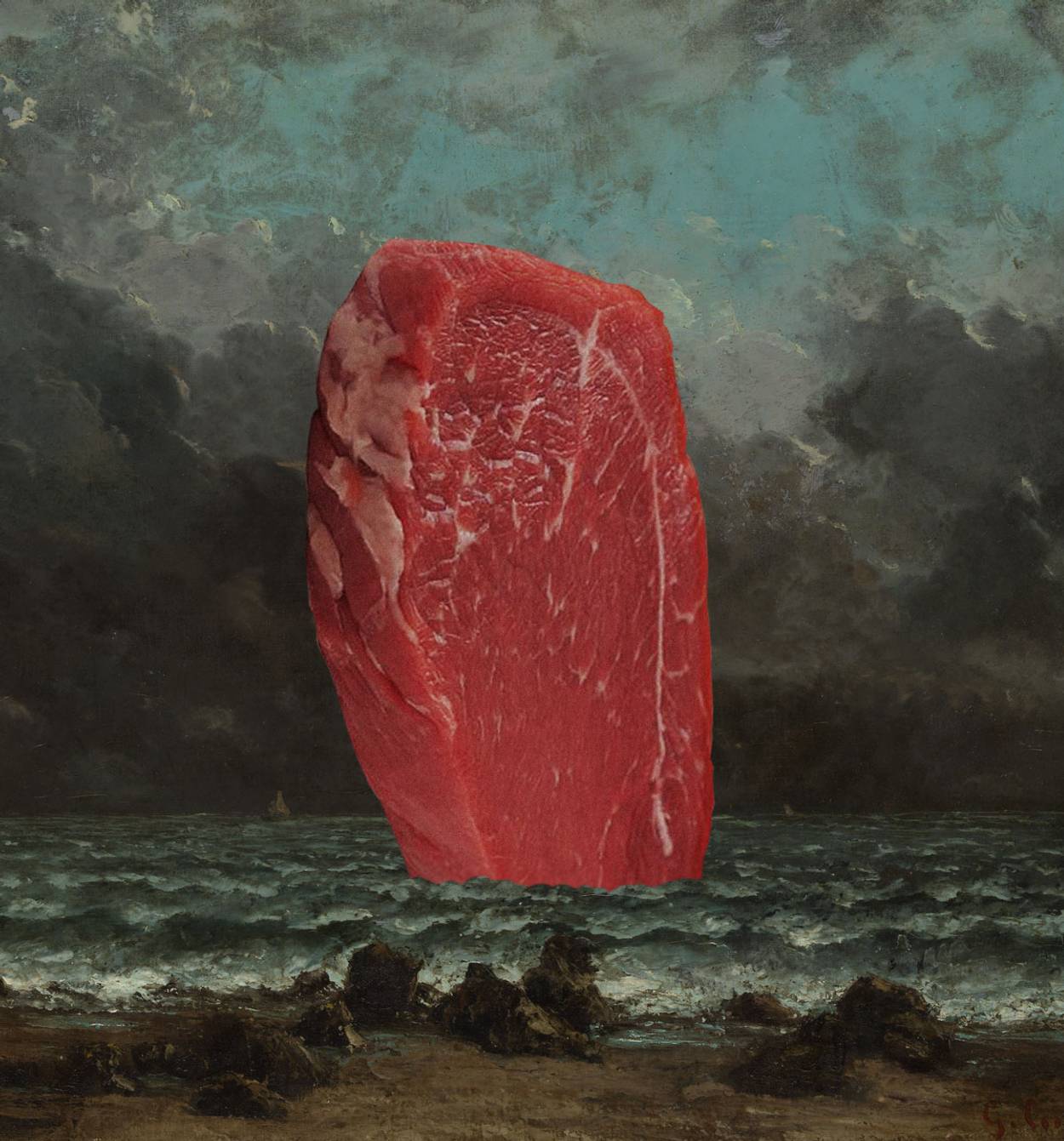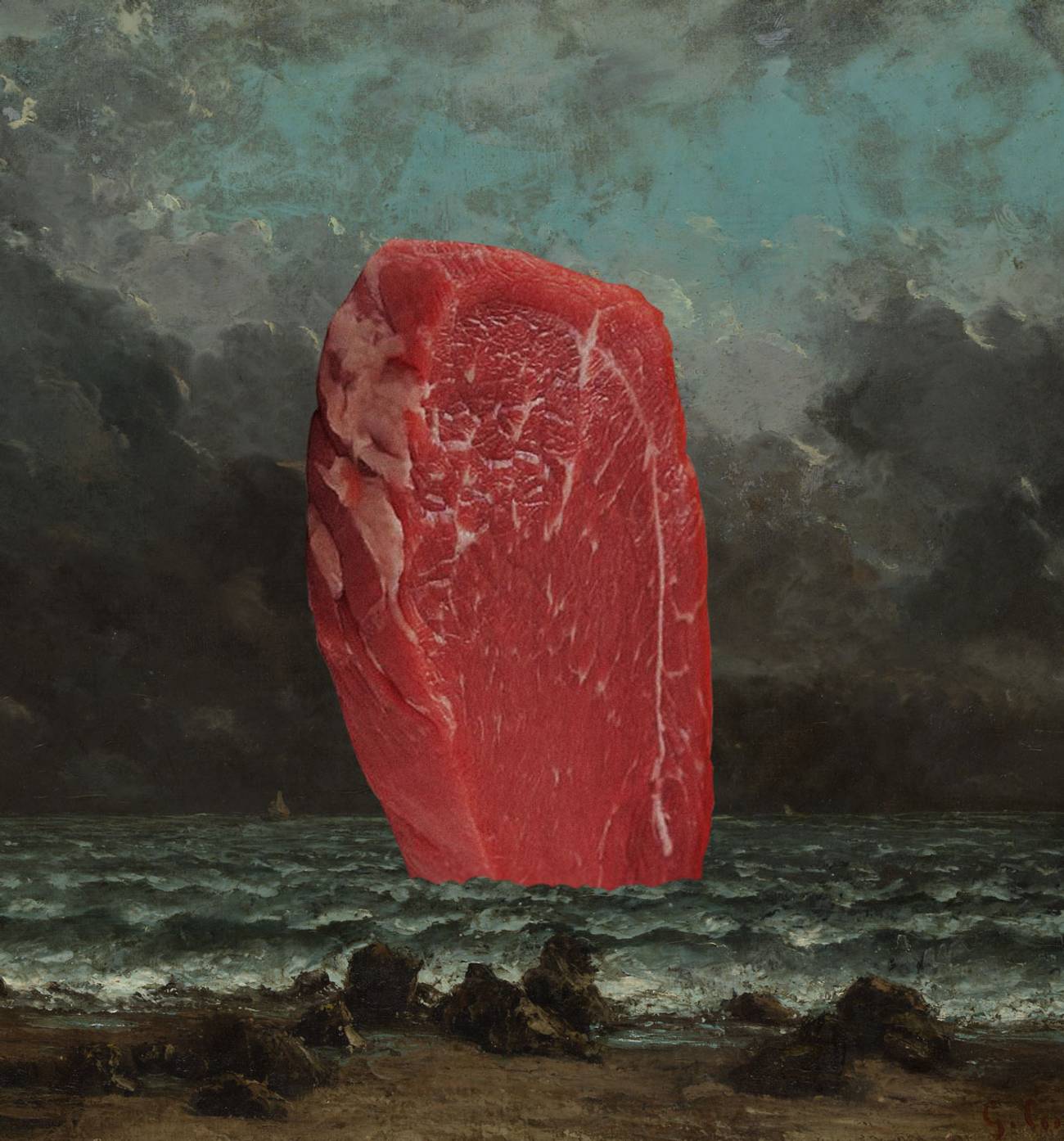We have Noah and the flood to thank for that post-Tisha B’Av medium-rare steak.
Many traditional Jews abstain from eating meat during the week or so before the fast day of Tisha B’Av (starting July 26 this year), as the sense of mourning over the Temple’s destruction reaches its culmination. Technically, you’re not even supposed to partake of any until noon the day after Tisha B’Av. After all, skipping out on that hot dog while catching a game at the House that Ruth Built seems like the least we can do to recognize how deprived we are spiritually by the absence of the House of Prayer.
But few realize that the very fact that Jews are allowed to eat meat at all is due to everyone’s favorite ark-builder. His salvaging mankind from a devastating deluge is pretty impressive. Guiding those animals two-by-two inside a boat is, as any owner of multiple pets will tell you, no easy feat. But it’s an oft-unnoticed postscript to the story of the flood that has given carnivores the world over reason to celebrate: It’s in conversation with Noah that God grants humanity permission to eat meat.
Whereas Adam and Eve’s Edenic diets were limited to things that grew from the ground, God tells Noah in Chapter 9 of Genesis: “Every moving thing that liveth shall be for food for you; as the green herb have I given you all.” Just be sure to remove the blood first: “Only flesh with the life thereof, which is the blood thereof, shall ye not eat.” Then, you have full permission to fire up that grill.
Readers of the Bible have struggled to understand: Why meat? Why now?
Jewish commentators’ answers have ranged across centuries and across continents, as Rabbi Avraham Stav traces in his recent Hebrew book Jewish Vegetarianism. For some, including the medieval Spanish philosopher Joseph Albo, permission to eat animal flesh was a much-needed reminder to man, following humanity’s antediluvian animalistic misbehaving, that, as you might find yourself reminding your 6-year-old when she’s not eating with a fork, “you’re not an animal.” Since the flood came because animals and humans were equal-opportunity violent offenders, God’s point now was to charge humanity to step it up and start behaving. It’s a reminder that being created in God’s image is less privilege than a call for moral responsibility.
To the Italian 16th-century rabbinic scholar Ovadya Sforno, this permission to eat meat was a temporary pause on what should have been a continuation of Eden’s eating habits. To recalibrate humanity following its destruction, short-term dispensation was granted. It was a concession to crisis, not an articulation of a new ideal.
The Zohar, which scholars believe was composed in 13th-century Spain, similarly presumes God had initially forbidden mankind from eating animals lest the latter have a negative influence on the former. But, as contemporary Bible professor Jonathan Grossman adds, once Adam and Eve blew their assignment to “watch over the land and keep it” when they tasted the forbidden fruit, humans lost the honor of being responsible for nature. Man was demoted from caregiver to simply top of the food chain.
The 20th-century American theologian Rabbi Joseph Soloveitchik and the former British Chief Rabbi Lord Jonathan Sacks perceived the consuming of animals to be an acquiescence. Following humanity’s savagery causing its own, rain-powered submersion, it was clear to God that violent tendencies were endemic among people. As Rabbi Sacks put it, it was as if God was saying, “Kill if you must, but let it be animals, not other humans, that you kill.”
Four hundred years earlier, back in Spain, the court adviser and sage Don Isaac Abarbanel steered clear of high-falutin philosophizing. Ever the politician, he argued that allowing meat was purely about feasibility. After all, had Noah and his family had to wait an entire planting and harvesting season after disembarking from the boat, they would have starved to death. Meat was the most efficient solution. Unbeknownst to Abarbanel, two-and-a-half centuries before him, the French Rabbi Jacob Anatoli also sensed principle emerging from practicality. Those aforementioned pairs of animals aboard the ark? They likely had kids during the voyage. One presumes, argues Anatoli, that Noah’s clan ate those due to lack of other viable options. God’s allowance of meat after landing, then, is a rubber stamp of what had originated as an emergency measure inside the ark.
Geography, perhaps, played a role. The 19th-century Meir Leibush ben Yehiel, better known as the Malbim, was no stranger to wandering himself, having searched for professional opportunities in Ukraine, Vienna, Bucharest, and Constantinople. He suggested that the vast and varied places mankind would settle across the globe once the land dried, including arid, unworkable desert, necessitated allowing for animals to be consumed.
Other rabbinic sages took a more proactively positive spin.
An ancient rabbinic midrash credits Noah’s bringing animal sacrifices after emerging safely from the ark as kashering the subsequent eating of animals. His individual sacrifice, this line of thinking goes, effectively triggered their permissibility. The 16th-century’s Maharal of Prague saw Noah’s having “walked with God” (per Genesis 6:9) as signifying humanity’s emergence from its initial existence as having been made from “the dust of the earth” (per Genesis 2:7). Once a product of nature, Noah now marked humanity’s standing above it.
The 19th-century European scholar known as the Chatam Sofer saw in Noah’s having saved the animals a merit that collectively elevated the souls of humankind. Now having achieved a loftier plane—what we might call in video game parlance, a “bonus level”—they were permitted to eat animals, who remained on a lower rung.
The contemporary Israeli scholar Yaakov Medan offers a more transactional take. In return for the domestication, care, and sustenance that humanity would offer countless pets over subsequent millennia, humans received “payment” in the form of permission to eat other animals, on occasion.
Then there was the metaphysical motivation. To the 13th-century Spanish Rabbi Joseph Gikatilla, shawarma is an opportunity for no less than mammalian metaphysical enlightenment. “Since the animal does not have an elevated soul that can appreciate God’s works and wonders,” he wrote, its being digested by people after ritual slaughter “is an act of mercy” that enables the animal to tap into the higher spiritual level of humans. Through being absorbed by a person’s digestive system, the consumed animals attain a higher level of being. So, too, Gikatilla notes, when humans pass away, their spirits are elevated to the angelic realm. Psalm 36’s verse “to man and beast God provides salvation” is proof that God grants beatitude to humans and beasts alike.
In more recent times, the first chief rabbi of Mandatory Palestine, Abraham Isaac Kook, saw in the eventual messianic redemption an opportunity for ultimate vegetarian victory. Citing the prophet Isaiah’s utopian vision that “the earth shall be full of the knowledge of the Lord, as the waters cover the sea,” Kook anticipated that animals’ recognition of God would be, after the Messiah’s arrival and the Jerusalem Temple’s rebuilding, equal to that of humans. Slaughtering animals would be a thing of the prior, spiritually less-elevated past. The only ritual sacrifices brought in the Third Temple would be the meat-less mincha offerings. We would return to how things used to be in the old country—that is, the Garden of Eden, where no meat was eaten.
Whether one concludes that slicing into that sizzling sirloin steak is a means of spiritual elevation or a disgraceful shanda signaling the fallen nature of man, one can still pause before taking that first bite after the Tisha B’Av fast to consider God’s and Noah’s conversation as humanity emerged from the ark anew.
Be conscious of what you eat and why you eat it, their exchange teaches us. Whether it’s beet soup or a burger, use the energy you gain from your food to bring the world closer to a renewed Eden while steering clear of the bestial bickering that brought on the flood.
Secondly, remember, as the ethicist Leon Kass has noted, that blood is not to be eaten, because “it is the life.” As he writes in The Beginning of Wisdom: Reading Genesis: “The operative principle is neither calculation nor compassion, but awe and respect. Life is to be respected, even in the taking of it—whether we like it or not, and whether the animal suffers or not.” Even if you don’t make like A.J. Jacobs and thank the thousand people whose work went into producing your cup of coffee, be grateful for the lives whose labors went into producing what’s on your plate. After all, it was baseless hatred that the Talmud tells us destroyed the Temple in the first place. Might as well try to rebuild it through proactive kindness and gratitude.
Lastly, remember that food is an opportunity for forging a covenantal community. As Jonathan Safran Foer, the author of Eating Animals, told an interviewer, “We do not simply feed our bellies, and we do not simply modify our appetites in response to principles. We eat to satisfy primitive cravings, to forge and express ourselves, to realize community. We eat with our mouths and stomachs, but also with our minds and hearts.”
So this coming break-fast, whether you pass on the schnitzel as a conscientious objector or pour ketchup over it and dig in, you can still raise a glass in appreciation of Noah. After steering mankind through a flood, he reminded us that the fortitude to rediscover faith and foster friendships can be found in our food.

